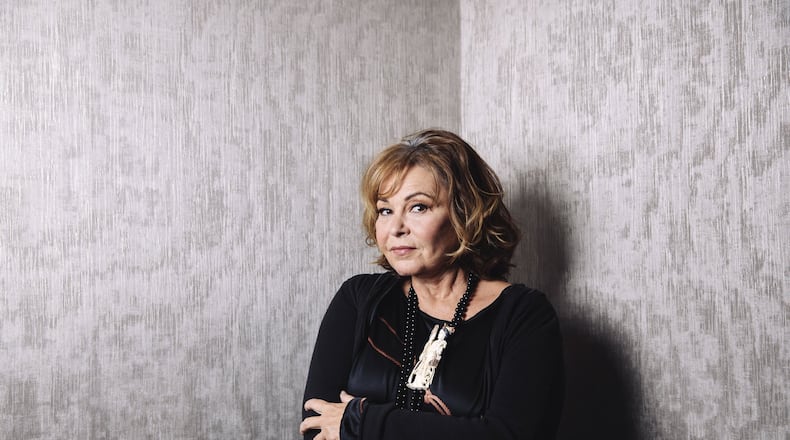Not long after she lost her hit sitcom over a racist tweet, Roseanne Barr said on Twitter that she was “tired of being smeared over a stupid mistake.” She’d earlier apologized for tweeting “Muslim brotherhood & planet of the apes had a baby=vj,” a slur about Obama administration official Valerie Jarrett.
But when ABC President Channing Dungey swiftly canceled the “Roseanne” reboot this week, were Barr’s free speech rights trampled, or was it a just action by a media giant at a time when race issues are at the forefront of the national conversation?
Political consultant Seth Weathers, former director of then-candidate Donald Trump’s Georgia campaign, sees a double standard in how Barr was treated, compared to how liberal celebrities such as Bill Maher fared after making offensive comments.
“I didn’t see people jump up and down when Bill Maher suggested Trump’s mother mated with an orangutan,” said Weathers, who served as campaign manager for Michael Williams, the gubernatorial candidate who generated headlines but few votes after driving his “Deportation Bus” around metro Atlanta. “I didn’t see him get called on to be fired.”
Weathers added his own tweet to the mix: “FYI this is the ‘African-American’ that (Barr) offended. Questions?’” Weathers said Barr may not have known that Jarrett, who is fair-skinned, is African-American. President Barack Obama’s former senior advisor said the matter could be “a teaching moment” during a discussion on MSNBC.
Trump sued Maher for $5 million in 2013 after the comic offered $5 million to charity if Trump could prove he wasn’t the son of an orangutan. The suit was later withdrawn. Maher also faced criticism for using the N-word on his HBO show, “Real Time With Bill Maher.” It is still on the air.
Comedian Samantha Bee apologized on Thursday after using a vulgar term to describe Ivanka Trump on her TBS show. The Atlanta-based network retweeted her apology and shared some of the blame: “Those words should not have been aired. It was our mistake too, and we regret it.”
“Full Frontal With Samantha Bee,” too, is still on the air.
Legal experts who discussed the Barr case with The Atlanta Journal-Constitution note the First Amendment protects Americans from government interference, not consequences from the private sector.
“In a private context, the First Amendment generally doesn’t apply,”said Peter Canfield, a First Amendment attorney at Jones Day. “In France, if you make anti-Semitic comments you can be prosecuted for it but the government can’t prosecute you here because of the First Amendment. But you can be subjected to public shame and ridicule. The American system relies on that to maintain a certain level of public discourse.”
Five years ago, Barr tweeted that then National Security Advisor and U.N. Ambassador Susan Rice was “a man with big swinging ape (anatomy).” That, too, was protected speech. Rice served as President Barack Obama’s senior advisor and, like Jarrett, is African-American.
“We’re lucky in this country that you can make a stupid remark and not go to prison,” said Cynthia Counts, a partner at Duane Morris, referring to free speech in general. “(Barr) has a right under the law to say what she wants. That’s free speech. But [ABC’s] firing her was their exercise of free speech. Unless there’s something in her contract, they have every right to fire her.”
Similarly, National Football League owners were within their rights as employers when they announced they’ll fine players who kneel on the field during the national anthem, said David E. Hudson, an attorney with Hull and Barrett in Augusta.
“If a player wanted to put on their jersey, ‘I Hate Trump,’ they could do it,” Hudson said. “But the employer could say, ‘You can do it but you’ll be fired.’ They have to right to obtain public opinion on their side but it’s not legally protected.”
Which leads to the question of censorship. Nsenga Burton is the chair of film and media at Clark Atlanta University. She said that freedom of speech doesn’t mean freedom from consequences, especially if that speech runs afoul of the values and ethics of an employer’s brand.
“Censorship is when you are prohibited from saying something about a topic on the front end,” Burton said. “If ABC had said, ‘Roseanne, you can’t have a Twitter account based on your controversial past,’ that’s censorship. But if they say, ‘We as a company have decided that because what you’re saying is not in keeping with our values, image and ethics, so we’re terminating our relationship with you,’ that’s not censorship, that’s discernment.”
About the Author





